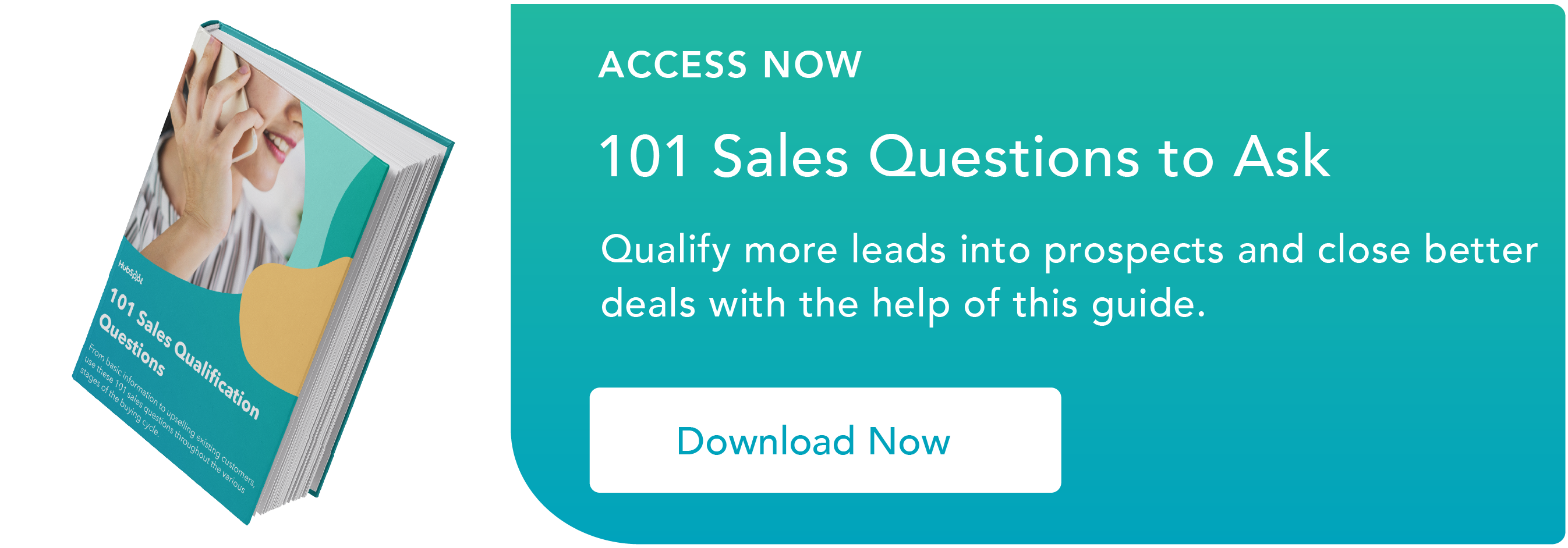When qualifying, you bring value to your prospects, clients, and yourself through the questions you ask — but only if they're good questions. One characteristic of great questions is that they are open-ended.

Open-ended questions create a learning experience for either the questioner (you), the person being questioned (your prospect or client), or both. Naturally, the best questions provide insight for all parties concerned.
I suspect you've heard the distinction between closed and open-ended questions before, and perhaps you're applying it already. Let's make sure you're using open-ended questions to their full value.
Table of Contents
What are open-ended questions?
Open-Ended Questions vs. Closed-Ended Questions
How to Ask Open-Ended Questions
Examples of Open-Ended Questions
Open-Ended Questions
Open-ended questions prompt a conversation because they can't be answered with one-word answers. An example of an open-ended question would be 'Where do you want to be in five years?' The answer to this questions varies from person to person, and can only be answered with a unique perspective that usually prompts a longer conversation.
You might be familiar with open-ended questions, but maybe not closed-ended questions, which you usually want to avoid.
Open-Ended vs. Closed-Ended Questions

Open-ended questions prompt the beginning of a longer conversation by asking questions starting with "why," "how," and "what if?" Closed-ended questions can be answered with single-word answers, such as "yes" or "no."
Open-ended questions and closed-ended questions both have their place in sales conversations. If you're only looking for one-word or quantitative answers, like the number size of the prospect's company or its annual revenue, asking a closed-ended question is an appropriate approach.
But when it comes to learning qualitative information during your initial discovery calls with prospects or new customers, open-ended questions can go a long way. Use a tool like HubSpot's free meeting scheduling tool to schedule your initial calls. Then ask open-ended questions to build trust and rapport, get to know the prospect and their needs, and begin building a positive relationship. Let's dig into how to do it well:
How to Ask Open-Ended Questions
If at the end of the meeting, I ask a prospect or client, "Did you find this meeting helpful?" I'm forcing them into a "yes" or "no" answer. And while it's good to know that they found the meeting helpful, unless they volunteer some elaboration to their answer, you don't know in what ways they experienced value. Maybe they're just being polite.
On the other hand, I could ask, "We've been through a bit of a process to get to this point, have we not? Can you tell me the value you feel you've received by going through this entire process?"
Now what happens? Your prospect or client clearly articulates their perception of the process, which helps you to get even clearer on your value. In addition, asking your prospects and clients about value actually helps them reinforce it in their own minds. The net result is that you become more preferable and earn the right to ask for referrals.
1. Transform any question into an open-ended question.
So here's your action step for the next few days. Start to pay attention to the questions you are asking your prospects, clients, and everyone else you encounter. Did you just ask a closed-ended question when an open-ended question would have yielded more information for both parties? Where appropriate, start to turn some of your closed-ended questions into open-ended questions.
2. If you ask a close-ended question, follow it up with an open-ended one.
Here's a quick little trick I discovered that might help. If you find yourself asking a closed-ended question, you can always open it up at the end. For example, if you start by asking "Did you find value in this process?" you can follow it up with, "If so, please tell me in what ways."
3. Use open-ended questions to start a conversation, not to run through a script.
Remember that open-ended questions are designed to start a conversation with people. You shouldn't be surprised or thrown off if the answers to an open-ended question lead to tangential offshoots, and you should have a plan in place for if that happens, because it means your open-ended questions were successful.
Make sure you're also actively listening to the answers to help you build rapport with prospects and become one of their trusted advisers.
There is so much to this topic that I couldn't possibly cover it in just one blog post, so you can expect me to revisit this concept in future posts. In my next article, I'm going to give some very specific high-value open-ended questions that you can use to bring value to your prospects, clients, and yourself very quickly.
Examples of Open-Ended Questions
- Whare the top priorities of your business at the moment?
- What are some of the best decisions you’ve made related to ___?
- How are you feeling about your current situation related to ___?
- If we were meeting five years from today, what needs to happen for you to feel good about your business situation related to ___?
- What opportunities do you see on your horizon?
- What challenges do you see to making those opportunities happen?
- How will you be measuring your success related to those outcomes?
- What’s the biggest risk of you not making progress on this situation?
- Who all needs to be involved in making the final purchasing decision?
- What is the motivation behind taking on this project?
Here are some open-ended, high-value questions you can ask your prospects:
1. What are the top priorities of your business at the moment?
This is a great alternative to the question, "What’s your main business goal?" Asking your contact to share their business priorities invites them to provide a holistic view of their current state of business. That information can give you valuable insight into how you can position your product or service to better resonate with them.
2. What are some of the best decisions you’ve made related to ___?
Instead of asking, "What did you focus on last year?" ask them to share some of their recent wins. This tells you what your prospect is currently celebrating, and by understanding what has recently gone well for them, you can learn how to present your product as their next good decision.
3. How are you feeling about your current situation related to ___?
If you don’t want to receive a one-word answer such as "good" or "fine", stay away from questions such as "How are you doing?" Asking them to describe their current situation invites the prospect to share their story and perspective with you, and creates a safe space to begin building trust.
4. If we were meeting five years from today, what needs to happen for you to feel good about your business situation related to ___?
Don’t put your prospect on the spot by asking an awkward question like "What’s your five-year plan?" While most businesses do have insight into what they want to accomplish in the future, asking for their future plans can lead to a deer in the headlights response. By asking them how you can help them reach their best case scenario, this opens the door to thoughtful conversation about their future plans in a low-pressure way.
5. What opportunities do you see on your horizon?
Asking your prospect what opportunities they would like to capitalize on is another low-pressure way to inquire about their future plans. This also gives you valuable information you can use to leverage your product as the key to helping them realize their opportunities.
6. What challenges do you see to making those opportunities happen?
Instead of asking what roadblocks they are facing, keep the conversation focused on their opportunities. This open-ended question gets the prospect thinking about how you can work together to remove the barriers to their goals.
7. How will you be measuring our success related to those outcomes?
This question is an inviting way to ask your prospect what their KPIs are. If you were to simply ask, "What are your KPIs?" they could provide a one-word answer such as "sales" which doesn’t give you much insight. By asking how they plan to measure success, the prospect has the opportunity to go in-depth explaining to you how they will know when they’ve reached their goals.
8. What’s the biggest risk of you not making progress on this situation?
If you were to ask a prospect, "What if you don’t hit your goals?" you could put them in the defensive. Instead, try asking what their risks are of not making progress. Not only is this question less accusatory, but it gives you the chance to work together and strategize on potential risk management practices.
9. Who all needs to be involved in making the final purchasing decision?
Finding the right decision maker is critical to making a sale. As you navigate the sales process, make sure you’re working with the right contact. Let’s be honest, there’s nothing worse than putting in the groundwork to get the deal, only to find out your prospect doesn’t have purchasing authority and can’t sign on the dotted line. Confirming who needs buy-in as a productive open-ended question.
10. What is the motivation behind taking on this project?
This question helps you understand your prospect’s decision making process. By learning what your prospect is motivated by, you will get clear on what results they are seeking from your product. This can help you set expectations, and speak to the features that matter most to your buyer. Additionally, by asking your prospect what factors are motivating their buying decisions, you give them a chance to share their values, which is important for building trust.
Want to learn more about sales qualification? Check out our comprehensive guide to sales qualification here.
![Free Download: 101 Sales Qualification Questions [Access Now]](https://no-cache.hubspot.com/cta/default/53/e97d6603-b40e-4085-ad55-0074b7351ead.png)

![21 Signs Your Buyer Is a Poor Fit [Sales Process Checklist], According to HubSpot's Former Sales Director](https://blog.hubspot.com/hubfs/Bad fit checklist.jpg)





![What a Client Intake Form Is & What It Should Look Like [Template]](https://blog.hubspot.com/hubfs/CLIENT INTAKE FORM (1).jpg)


